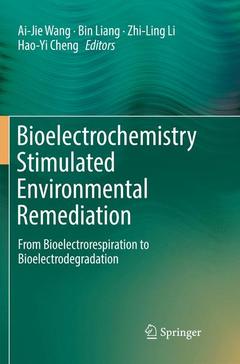Bioelectrochemistry Stimulated Environmental Remediation, Softcover reprint of the original 1st ed. 2019 From Bioelectrorespiration to Bioelectrodegradation
Coordonnateurs : Wang Ai-Jie, Liang Bin, Li Zhi-Ling, Cheng Hao-Yi

This book reviews the latest advances in the bioelectrochemical degradation of recalcitrant environmental contaminants. The first part introduces readers to the basic principles and methodologies of bioelectrochemical systems, electron-respiring microorganisms, the electron transfer mechanism and functional electrode materials. In turn, the second part addresses the bioelectrochemical remediation/treatment of various environmental pollutants (including highly toxic refractory organics, heavy metals, and nitrates) in wastewater, sediment and wetlands. Reactor configuration optimization, hybrid technology amplification and enhanced removal principles and techniques are also discussed.
The book offers a valuable resource for all researchers and professionals working in environmental science and engineering, bioelectrochemistry, environmental microbiology and biotechnology.
Dr. Ai-Jie Wang is a professor at the School of Environment, Harbin Institute of Technology and Research Center for Eco-Environmental Sciences, Chinese Academy of Sciences (CAS). She is also Director of the CAS Key Laboratory of Environmental Biotechnology. Dr. Wang received her B.S. in Biology in 1995 from Harbin Normal University and her Ph.D. in Environmental Engineering in 2000 from Harbin Institute of Technology. Her current interests include wastewater biological treatment and resource recovery as well as bio(electro)degradation of environmental pollutants and corresponding mechanisms. She has developed a series of innovative wastewater treatment technologies and realized full-scale applications of such technologies. She has published over 240 SCI-indexed papers.
Dr. Bin Liang is an assistant professor at the Research Center for Eco-Environmental Sciences, CAS. He received his B.S. in Bioengineering in 2007 from Jilin Agricultural University and his M.S. in Microbiologyin 2010 from Nanjing Agricultural University, followed by a Ph.D. in Environmental Science and Engineering from Harbin Institute of Technology in 2014. His interests include metabolic mechanisms and microbial ecology related to the bio(electro)degradation of emerging environmental contaminants. He has published over 40 SCI-indexed papers.
Dr. Zhi-Ling Li is an associate professor at the School of Environment, Harbin Institute of Technology. She received her B.S. in Environmental Engineering in 2004 and M.S. in Environmental Science in 2007 from China University of Geoscience (Beijing), followed by a Ph.D. in Environmental Engineering from Nagoya University in Japan in 2010. Her research interests include biotransformation mechanisms of refractory organic contaminants and related bioremediation technologies and applications. She has published over 30 SCI-indexed papers.
Dr. Hao-Yi Cheng received his Ph.D. from Harbin Institute of Technology in 2013 before serving asan
Date de parution : 12-2018
Ouvrage de 300 p.
15.5x23.5 cm
Date de parution : 08-2018
Ouvrage de 300 p.
15.5x23.5 cm


